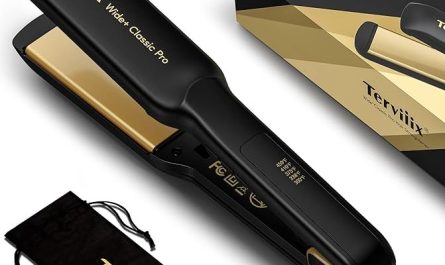Introduction to Bamboo Toothbrushes
The bamboo toothbrush is a game-changer for eco-conscious oral care. Made from sustainably sourced bamboo and soft bristle toothbrush options, it offers a plastic-free alternative to conventional hygiene routines.
Environmental Impact:
Traditional plastic toothbrushes take 450+ years to decompose, while a bamboo toothbrush breaks down in 3–6 months. Bamboo requires no pesticides and grows 30% faster than other plants, reducing deforestation pressure.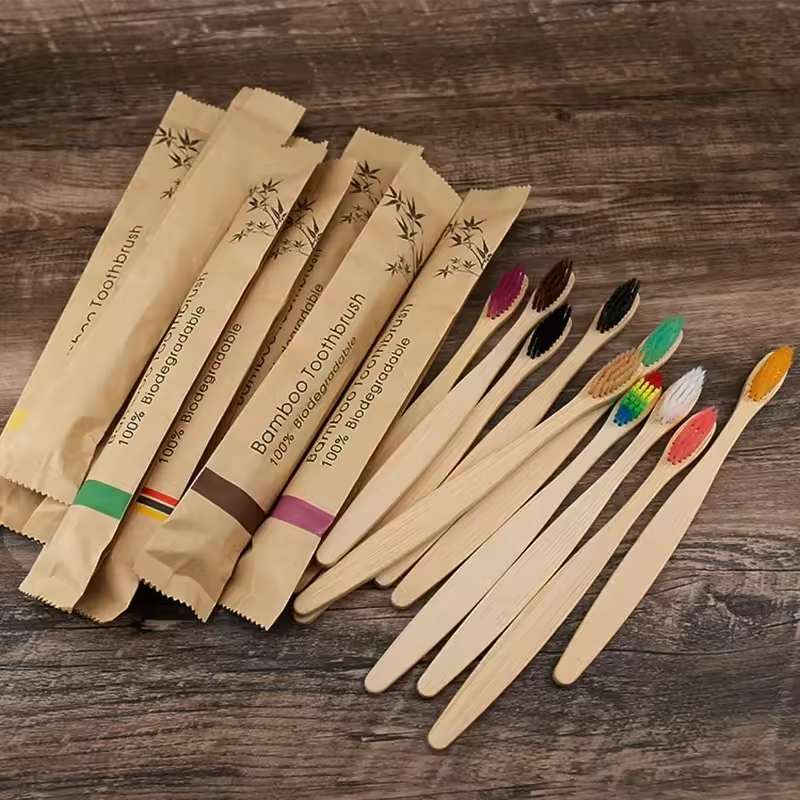
Design Features:
- Handles: Naturally antimicrobial, with engraved grooves to prevent slipping.
- Bristles: Options include nylon-4 (recyclable) or plant-based materials like castor oil.
Why Choose Bamboo?
- Cost-Effective: Competitive pricing with plastic brushes.
- Ethical Sourcing: Look for FSC-certified brands supporting fair labor practices.
Maintenance Tips:
- Air-dry upright after use to prevent mold.
- Compost the handle; recycle bristles separately.
The bamboo toothbrush isn’t just a tool—it’s a statement for sustainability without compromising dental health.
Environmental Benefits of Bamboo Toothbrushes
Switching to a bamboo toothbrush delivers profound ecological benefits compared to plastic alternatives. Here’s how it helps heal the planet:
1. Rapidly Renewable Material
- Bamboo Growth: Harvested every 3–5 years, unlike plastics requiring centuries-old fossil fuels.
- No Chemicals: Grows naturally without pesticides, protecting soil and water ecosystems.
2. Zero Plastic Waste
- Biodegradability: Decomposes in 3–6 months vs. plastic’s 450+ years.
- Global Impact: 3 billion plastic toothbrushes enter landfills yearly—each bamboo toothbrush prevents one from joining them.
3. Lower Carbon Footprint
- Production Emissions: Bamboo requires 1/3 less energy to produce than plastic.
- Carbon Absorption: Bamboo forests absorb 12 tons of CO₂ per acre annually.
4. Water Conservation
- Growth Needs: Uses 1/3 less water than cotton (common in biodegradable alternatives).
5. Ocean Protection
- Marine Life Safety: Avoids microplastics that harm marine animals—over 700 species ingest plastic debris yearly.
6. Ethical Sourcing
- Fair Trade: Many brands partner with farmers for fair wages and sustainable practices.
The bamboo toothbrush isn’t just eco-friendly—it’s a tangible step toward reversing plastic pollution while supporting regenerative agriculture.
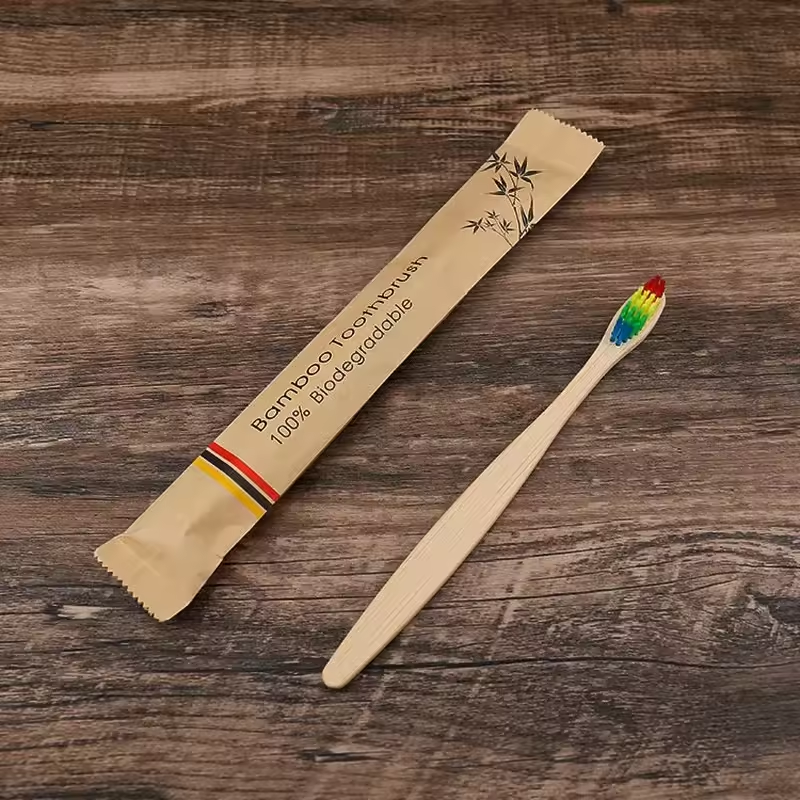
How to Choose the Right Bamboo Toothbrush
Selecting the perfect bamboo toothbrush requires evaluating materials, design, and ethics. Follow these steps for a product that aligns with your values and needs:
1. Check Material Certifications
- Handle: Look for FSC (Forest Stewardship Council) certification for sustainable bamboo sourcing.
- Bristles: Opt for nylon-4 (recyclable) or plant-based options like castor oil. Avoid plastic bristles labeled “biodegradable” without proof.
2. Prioritize Brush Type
- Soft Bristle Toothbrush: Best for sensitive gums and enamel protection.
- Medium/Hard Bristles: Reserve for heavy plaque buildup—avoid overuse to prevent gum recession.
3. Design Features
- Handle Texture: Look for engraved grooves or silicone grips to prevent slipping.
- Size: Compact handles for small hands or travel-friendly options.
4. Brand Ethics
- Carbon-Neutral Packaging: Brands like Brush with Bamboo use recycled materials.
- Fair Trade: Support companies partnering with ethical farmers.
5. Durability Checks
- Curing Process: Well-treated bamboo resists moisture; avoid warped or splintered handles.
- Brace Sturdiness: Ensure bristles are securely glued to the handle.
6. Disposal Considerations
- Compostability: Confirm the handle is 100% biodegradable.
- Recyclable Parts: Some brands offer bristle recycling programs.
The ideal bamboo toothbrush balances sustainability, comfort, and quality—read reviews and certifications to make the best choice.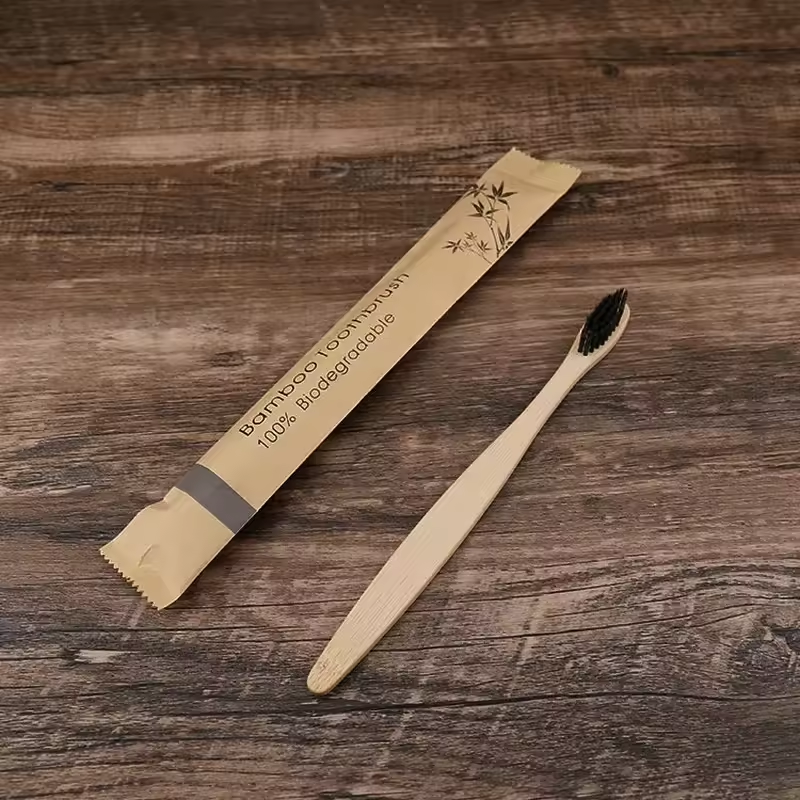
Care and Maintenance Tips
Proper care extends the lifespan of your bamboo toothbrush and ensures hygiene. Follow these steps for optimal performance:
1. Post-Use Care
- Rinse Thoroughly: Remove toothpaste residue with warm water.
- Air-Dry Upright: Store in a rack to prevent moisture buildup, which causes mold.
2. Disinfection Options
- White Vinegar Soak: Mix 1:1 with water and soak weekly for 10 minutes.
- Hydrogen Peroxide Spray: Lightly mist bristles to kill bacteria.
3. Handle Maintenance
- Avoid Submersion: Prolonged water exposure weakens bamboo.
- Check for Mold: Discard if black spots appear on the handle.
4. Bristle Care
- Inspect Regularly: Replace if bristles fray or bend—soft bristle toothbrushes lose effectiveness over time.
- 3-Month Replacement: Follow ADA guidelines for oral health.
5. Storage Tips
- Sunlight Exposure: Dry brushes in sunlight to inhibit mold growth.
- Avoid Closed Containers: Airflow prevents bacterial buildup.
6. End-of-Life Disposal
- Compost the Handle: Chop into small pieces for faster decomposition.
- Recycle Bristles: Look for brands offering take-back programs for nylon bristles.
With these steps, your bamboo toothbrush stays hygienic and functional—making sustainability effortless.
Sustainability in Dental Care
Sustainable dental care merges oral health with environmental responsibility. Here’s how to reduce your footprint while maintaining a healthy smile:
1. Embrace Bamboo Alternatives
- Bamboo Toothbrush: A zero-plastic option that decomposes in months. Opt for soft bristle toothbrushes to protect gums while being eco-friendly.
- Bamboo Toothpaste Tablets: Dissolve in water for a plastic-free toothpaste alternative.
2. Eco-Friendly Oral Care Products
- Refillable Toothpaste: Brands like Georganics offer metal tubes with refillable cores.
- Waxed Floss: Made from silk or bamboo fiber instead of nylon microplastics.
3. Reduce Resource Waste
- Water Conservation: Turn off taps while brushing—save 3 gallons daily.
- Energy Efficiency: Use manual toothbrushes over electric models to cut energy use by 90%.
4. Ethical Brand Choices
- Transparent Sourcing: Look for companies using Fair Trade ingredients or carbon-neutral shipping.
- Packaging Innovations: Brands like Bite Dental use compostable boxes and aluminum refills.
5. Community Impact
- Advocate for Change: Support policies banning microbeads and promoting bamboo farming.
- Educate Others: Share tips on replacing plastic tools with sustainable alternatives.
6. Future Innovations
- Edible Toothpaste: Plant-based formulas being tested for zero-waste oral care.
- Recycled Materials: Toothbrush handles from ocean plastic waste.
Sustainable dental care isn’t just a trend—it’s a commitment to preserving both oral health and the planet.
Bamboo vs. Plastic Toothbrushes
The debate between bamboo toothbrushes and plastic toothbrushes hinges on sustainability, health, and practicality. Here’s a detailed comparison to guide your choice:
1. Material Sourcing
- Bamboo Toothbrush: Made from fast-growing, pesticide-free bamboo. Requires 1/3 less water and no fossil fuels.
- Plastic Toothbrush: Dependent on petroleum-derived polypropylene, a non-renewable resource.
2. Environmental Impact
- Decomposition: A bamboo toothbrush biodegrades in 3–6 months; plastic takes 450+ years.
- Carbon Footprint: Bamboo farming absorbs 12 tons of CO₂ per acre annually. Plastic production emits 3x more greenhouse gases.
- Waste Contribution: 3 billion plastic toothbrushes clog landfills yearly—each bamboo alternative reduces this by one.
3. Durability & Maintenance
- Bamboo: Resists moisture with proper curing but may warp if left damp.
- Plastic: More durable in wet environments but prone to microplastic shedding into waterways.
4. Health Considerations
- Soft Bristle Toothbrush: Bamboo options often use nylon-4 (recyclable) or plant-based bristles, avoiding BPA.
- Plastic: Many contain microplastics that enter the body during brushing.
5. Cost Analysis
- Initial Price: Bamboo is 10–20% more expensive upfront.
- Long-Term Savings: Plastic requires constant replacement (every 3 months), while bamboo’s compostable handle avoids landfill costs.
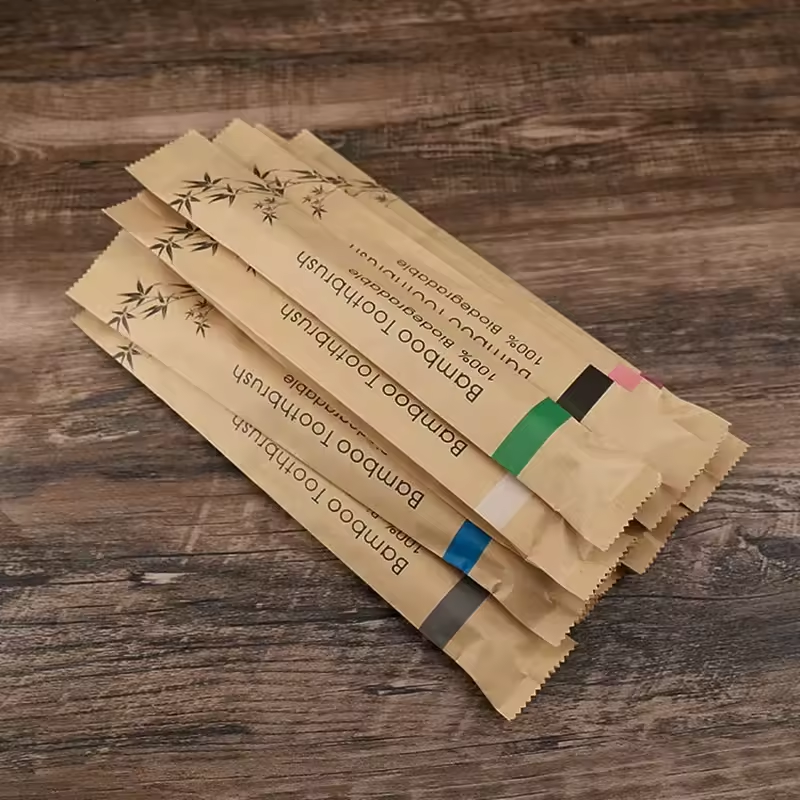
6. Social & Ethical Impact
- Bamboo: Supports sustainable farming and rural economies.
- Plastic: Often linked to unethical labor practices and ocean pollution.
Final Verdict: While plastic toothbrushes offer convenience, bamboo toothbrushes deliver unmatched environmental and health benefits. The switch requires minimal effort but yields lasting ecological impact.
The Role of Soft Bristle Toothbrushes
Soft bristle toothbrushes are essential for preserving oral health while minimizing damage to teeth and gums. Here’s why they’re a smart choice:
1. Gentle Oral Care
- Gum Protection: Soft bristles reduce irritation and recession, lowering bleeding risk by 40%.
- Enamel Safety: Avoid scratching tooth surfaces—critical for those with sensitive or thinning enamel.
2. Versatility in Use
- Sensitive Teeth: Ideal for post-whitening or cavity treatments.
- Orthodontic Patients: Cleans around braces without bending wires.
- Children’s Oral Care: Teaches brushing habits without harming developing gums.
3. Sustainable Options
- Pair with a bamboo toothbrush for a zero-plastic oral care routine. Brands like Brush with Bamboo offer soft nylon-4 bristles.
4. Misconceptions Debunked
- Myth: “Soft bristles don’t clean effectively.”
- Fact: ADA confirms soft bristles remove plaque as well as harder ones when used properly.
5. Proper Technique Tips
- Angle Matters: Hold at 45° to gums for optimal cleaning.
- Pressure Check: Avoid pressing hard—the bristles should flex slightly.
6. Long-Term Benefits
- Prevent Receding Gums: A leading cause of tooth sensitivity and loss.
- Extend Toothbrush Life: Soft bristles fray slower than stiff ones.
The soft bristle toothbrush isn’t just for sensitive mouths—it’s a universal tool for maintaining oral health sustainably.
Final Tips for Adopting Eco-Friendly Oral Care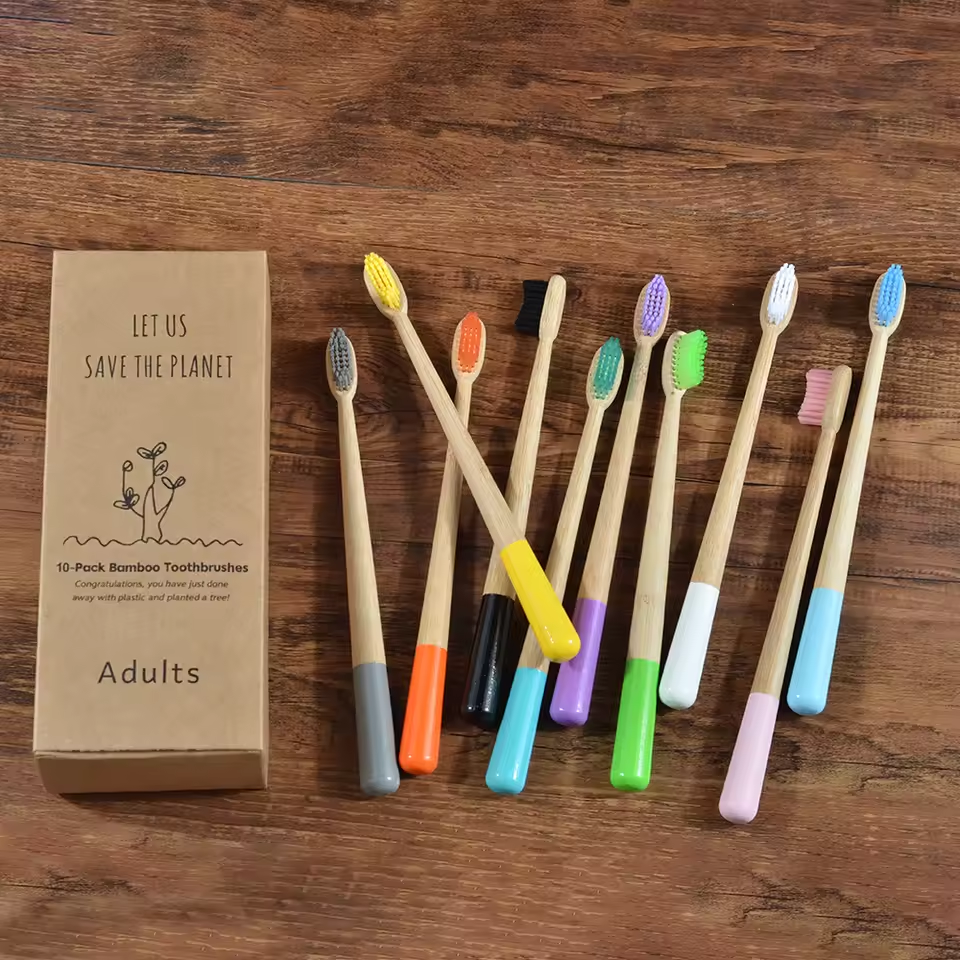
Transitioning to eco-friendly oral care requires mindful choices and habits. Here’s how to adopt a sustainable routine effectively:
1. Start Small
- Swap One Product at a Time: Begin with a bamboo toothbrush paired with a soft bristle toothbrush option. Gradually replace plastic tools with bamboo, glass, or metal alternatives.
2. Choose Zero-Waste Products
- Refillable Toothpaste: Brands like Georganics offer aluminum tubes with refillable cores.
- Wax Floss: Made from silk or bamboo fiber instead of nylon microplastics.
3. Optimize Water Usage
- Turn Off the Tap: Save 3 gallons of water daily by only running the faucet during rinsing.
- Use a Cup: Rinse water into a reusable cup instead of a glass to reduce waste.
4. Dispose Responsibly
- Compost Bamboo Handles: Chop them into small pieces for faster decomposition.
- Recycle Bristles: Look for brands with bristle recycling programs (e.g., Radius Brushes).
5. Educate Your Family
- Teach Kids Early: Use bamboo toothbrushes with fun designs to normalize eco-conscious habits.
- Share Tips: Demonstrate how to air-dry brushes and avoid over-purchasing.
6. Support Ethical Brands
- Look for Certifications: FSC (for bamboo sourcing), B Corp, or Carbon Neutral labels.
- Advocate for Transparency: Choose companies that disclose supply chains and environmental impact.
7. Regularly Review Your Routine
- Audit Products: Replace single-use items as they wear out.
- Stay Informed: Follow trends like edible toothpaste or ocean-plastic toothbrushes.
Small changes add up: A bamboo toothbrush prevents plastic waste, but paired with mindful habits, it sparks a ripple effect toward a healthier planet.

